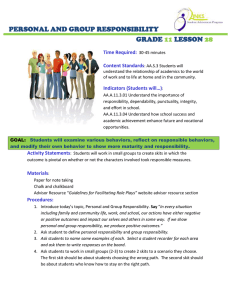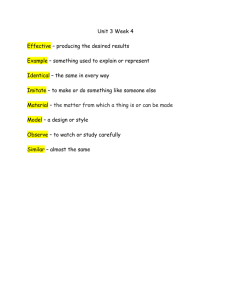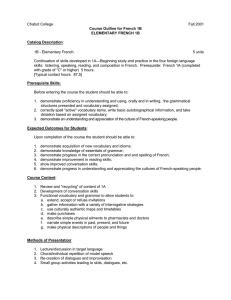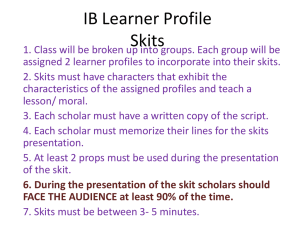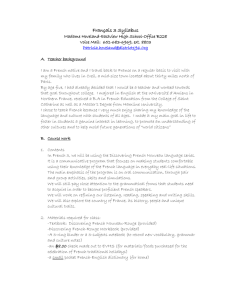Madison Public Schools Grade 6 French
advertisement
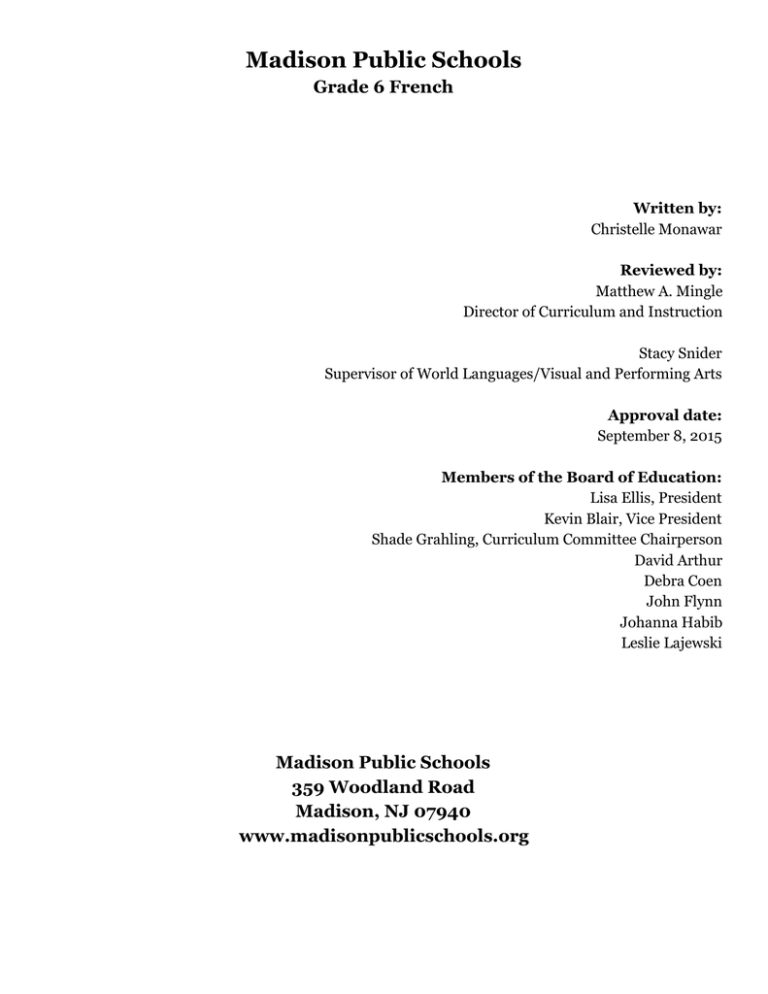
Madison Public Schools Grade 6 French Written by: Christelle Monawar Reviewed by: Matthew A. Mingle Director of Curriculum and Instruction Stacy Snider Supervisor of World Languages/Visual and Performing Arts Approval date: September 8, 2015 Members of the Board of Education: Lisa Ellis, President Kevin Blair, Vice President Shade Grahling, Curriculum Committee Chairperson David Arthur Debra Coen John Flynn Johanna Habib Leslie Lajewski Madison Public Schools 359 Woodland Road Madison, NJ 07940 www.madisonpublicschools.org Course Overview Description French 6 introduces students to the French Language and culture through the four skills of Language Learning - listening, speaking, reading, and writing - and through multi-media exposure to authentic culture. Students acquire and demonstrate competence of these skills using Interpretive, Interpersonal, and Presentational modes of communication. French 6 offers opportunities for students to use 21st Century Skills to effectively enhance their own learning of the language, and to be aware of the positive impact that learning a language can present them. Each unit offers a new linguistic and cultural context, that students will learn to navigate with increasing independence and creativity. Students will learn to introduce themselves and address people informally and formally. They will be able to provide basic information about themselves, their friends and family members (name, age, nationality, physical description and personality). They will become aware of the extent and variety of the French-speaking world. They will also be able to discuss school and compare school systems and schedules. They will be able to discuss preferences, and compare leisure activities in the United states and in France. Goals This course aims to: ● develop linguistic and global cultural knowledge and awareness to better prepare them to become productive 21st century citizens. ● build a foundation in the knowledge of the French language and improve general language skills (reading, writing, listening and speaking). ● improve oral communication skills in a relevant cultural context. Resources Suggested activities and resources page Unit 1 Overview Unit Title: All about Me Unit Summary: This unit will familiarize students with the French culture and make them aware of the extent of the French-speaking world. They will understand that there are many differences between cultures and languages but also many similarities. They will be able to introduce themselves and greet formally and informally, as well as discuss age and nationality. Suggested Pacing: 37 lessons Learning Targets Unit Essential Questions: ● Why do people from different cultures sometimes say and behave differently from what I am accustomed to? ● How can learning other languages and about different cultures help me understand my own culture and gain 21st century life skills? Unit Enduring Understandings: ● Learning another language and about other cultures helps one better understand one’s own. ● Learning another language and about other countries and cultures greatly contributes to one’s success in becoming a productive and responsible 21st century global citizen. Evidence of Learning Unit Benchmark Assessment Information: C’est Moi! Objectives (Students will be able to…) Greet and introduce oneself Essential Content/Skills Content: Formal and informal greetings, the alphabet, French-speaking countries and territories, Typical French names Skills: Greet people formally and informally, Say/ask what one’s name is Spell one’s name Understand the importance of cognates and context to predict meaning in another language Ask/say how one feels Suggested Assessments Informal/formal introduction/greeting skits. French speaking country research and slide (key facts about one country) to share with/present to class. Standards (NJCCCS CPIs, CCSS, NGSS) 7.1.NM.A.2.Demonstrate comprehension of simple, oral and written directions, commands, and requests through appropriate physical response. Pacing 9 lessons 7.1.NM.A.3. Recognize a few common gestures and cultural practices associated with the target culture(s). 7.1.NM.B.3 Imitate appropriate gestures and intonation of the target culture(s) / language during greetings, leave-takings and daily interactions. 7.1.NM.C.4 Present information from ageand level-appropriate, culturally authentic materials orally or in writing. Content: General feelings (one would use when greeting someone) Informal/formal introduction/greeting skits (Rubric) 7.1.NM.A.5 Demonstrate comprehension of brief oral and written messages using age- and level-appropriate culturally authentic materials on familiar topics. Skills: Ask/say how one feels Quiz 1.1 (listening/writing) 7.1.NM.B.5 Exchange information using words, phrases, and short sentences practiced in class on familiar topics or on topics studied in other content areas. 7 lessons 7.1.NM.C.2 Imitate, recite, and/or dramatize simple poetry, rhymes, songs and skits. Ask/say one’s age Content: Numbers 0-20, age Skills: Count, recognize, say and write numbers 0-20 Ask/say one’s age Informal/formal introduction/greeting skits. 7.1.NM.A.5 Demonstrate comprehension of brief oral and written messages using age- and level-appropriate culturally authentic materials on familiar topics. 8 lessons Quiz 1.2 (listening/writing) 7.1.NM.B.5 Exchange information using words, phrases, and short sentences practiced in class on familiar topics or on topics studied in other content areas. 7.1.NM.C.3 Copy/write words, phrases, or simple guided texts on familiar topics. Ask/say where one is from and one’s nationality Content: Nationalities Skills: Ask and say one’s nationality Understand that nationalities (as other adjectives in French) agree with the person/thing described. Informal/formal introduction/greeting skits. Quiz 1.3 (listening/writing) Unit 1 test (reading/writing listening/speaking) C’est Moi project (benchmark assessment) 7.1.NM.A5 Recognize familiar spoken or written words and phrases contained in culturally authentic materials using electronic information sources related to targeted themes. 7.1.NM.B.1 Use digital tools to exchange basic information at the word and memorized-phrase level related to self and targeted themes. 7.1.NM.C.5 Name and label tangible cultural products and imitate cultural practices from the target culture(s). 13 lessons Unit 2 Overview Unit Title: My School Unit Summary: In this unit, students will learn school-related vocabulary (people/objects/subjects). They will communicate to express their opinion about school and to provide and obtain information about subjects they take at school. They will discuss their school schedules, while learning how to tell time and say the date. They will also compare French and American school systems and vacation/holidays that occur during the school year. Suggested Pacing: 42 lessons Learning Targets Unit Essential Questions: ● What are advantages and disadvantages of French and American school systems? ● What school model would best fit the needs of global 21st century citizens? Unit Enduring Understandings: ● Differences in school systems reflect distinct cultures and pedagogical philosophies. ● No existing school system is perfect but comparing different models can help improve one’s own. Evidence of Learning Unit Benchmark Assessment Information: My School Schedule Objectives (Students will be able to…) Compare the U.S. and French school systems Essential Content/Skills Content: school types and grades, typical Middle school schedule and school subjects, standardized exams Skills: Understand the main similarities and differences between French and American schools and school systems Know basic school vocabulary and respond to classroom commands Content: general school-related vocabulary, school supplies, classroom commands, indefinite articles (un/une/des). Skills: Recognize/name/write school supplies/objects and people. Understand and respond physically to classroom commands Ask/say what one has and what is in the classroom, at school or in one’s bag Content: location words and phrases, verb to have (“avoir”), definite articles le/la/les. Suggested Assessments Report from Q@A with students and teacher(s) from our sister middle school in France (Q@A via Skype). Content: likes/dislikes, school subjects, verb “faire” in the context of school subjects Skills: Express preferences/likes /dislikes. 7.1.NM.A.1 Recognize familiar spoken or written words and phrases contained in culturally authentic materials using electronic information sources related to targeted themes. Pacing 6 lessons 7.1.NM.B.1 Use digital tools to exchange basic information at the word and memorized-phrase level related to self and targeted themes. 7.1.NM.C.1 Use basic information at the word and memorized phrase level to create a multimedia-rich presentation on targeted themes to be shared virtually with a target language audience. Conjuguemos website school vocabulary timed quiz (translation of suggested words/phrases in English have to be typed in) 7.1.NM.A.2 Demonstrate comprehension of simple, oral and written directions, commands, and requests through appropriate physical response. 6 lessons 7.1.NM.B.2 Give and follow simple oral and written directions, commands, and requests when participating in age-appropriate classroom and cultural activities. 7.1.NM.C.3 Copy/write words, phrases, or simple guided texts on familiar topics. Quiz 2.1 Skits 7.1.NM.A.4 Identify familiar people, places, and objects based on simple oral and/or written descriptions. 5 lessons 7.1.NM.B.5 Exchange information using words, phrases, and short sentences practiced in class on familiar topics or on topics studied in other content areas. Skills: Describe what one has and what there is/are in one’s bag, classroom, school. Ask/say where certain classroom objects are specifically located in the classroom? Express likes/dislikes regarding school subjects and discuss what subjects one has at school Standards (NJCCCS CPIs, CCSS, NGSS) 7.1.NM.C.2 Imitate, recite, and/or dramatize simple poetry, rhymes, songs and skits. Skits Quiz 2.2 Conjuguemos website school subjects timed quiz 7.1.NM.A.4 Identify familiar people, places, and objects based on simple oral and/or written descriptions. 5 lessons 7.1.NM.B.4 Ask and respond to simple questions, make requests and express preferences using memorized words and phrases. 7.1.NM.C.2 Imitate, recite, and/or dramatize simple poetry, rhymes, songs and skits. Discuss one’s school and holiday/ vacation schedule Content: Months of the year, days of the week, numbers 21-31, date, time (including military), holidays. Quiz 2.3 Reading comprehension test (understanding a French school schedule) 7.1.NM.A.5 Demonstrate comprehension of brief oral and written messages using age- and level-appropriate culturally authentic materials on familiar topics. 20 lessons Skills: Recognize/say/write the months of the year/ days of the week and numbers 21-31. Say and write the date Tell time and understand that military time is commonly used in France and many European countries. Talk about one’s school schedule Compare French and American school schedules. Discuss French v.s US major vacation/school breaks and holidays Listening performance test (fill out a school schedule according to the description students hear) 7.1.NM.B.5 Exchange information using words, phrases, and short sentences practiced in class on familiar topics or on topics studied in other content areas. Unit 2 writing test 7.1.NM.C.5 Name and label tangible cultural products and imitate cultural practices from the target culture(s). My School Schedule project (benchmark assessment) Unit 3 Overview Unit Title: My friends and family Unit Summary: In this unit, students will be able to describe and give information about themselves, their friends and members of their family. They will compare the concept of family in their culture and subculture to the ones in France and other French-speaking regions. Suggested Pacing: 36 lessons Learning Targets Unit Essential Questions: ● What does the concept of family mean for people in different cultures and subcultures? ● Who are the people that matter to me? Unit Enduring Understandings: ● Family structure varies according to one’s culture and subculture. ● People that matter to me most may be friends/and or different family members. ● Important people in my life may influence my life choices as I may influence theirs. Evidence of Learning Unit Benchmark Assessment Information: My Family Album Objectives (Students will be able to…) Compare family in the US, in France and other select French-speaking countries Essential Content/Skills Content: cultural information about family (US, France and some other French-speaking countries) Skills: Discuss differences and similarities in what the concept of family means for us and for people in France and other select French-speaking regions Know family/friends/ people -related vocabulary and common pets Content: family, pets, people, friends Suggested Assessments Venn diagram from Q@A with students and teacher(s) from our sister middle school in France (Q@A via Skype) and additional research done for other French-speaking regions. Standards (NJCCCS CPIs, CCSS, NGSS) 7.1.NM.A.1 Recognize familiar spoken or written words and phrases contained in culturally authentic materials using electronic information sources related to targeted themes. Pacing 6 lessons 7.1.NM.B.1 Use digital tools to exchange basic information at the word and memorized-phrase level related to self and targeted themes. 7.1.NM.C.1 Use basic information at the word and memorized phrase level to create a multimedia-rich presentation on targeted themes to be shared virtually with a target language audience. Conjuguemos website family and people vocab timed quiz. Skills: Say/write who people (and pets are) to me 7.1.NM.A.4 Identify familiar people, places, and objects based on simple oral and/or written descriptions. 5 lessons 7.1.NM.B.5 Exchange information using words, phrases, and short sentences practiced in class on familiar topics or on topics studied in other content areas. 7.1.NM.C.3 Copy/write words, phrases, or simple guided texts on familiar topics. Ask/give information about one’s relatives, friends and pets Content: third person (family members/pets/ friends) questions and information, possessive adjectives (my, your, his her). Skits Content: physical traits (adjectives), verb to be (“être”), regular and irregular adjectives of personality, position of different adjectives in the sentence (regular and BAGS adj);impersonal expressions (c’est/ce sont, il/elle est). Skills: Describe one’s relative/pet or friend. Understand that adjectives are variable in French and know how to modify regular adjectives (fem/plural) and irregular adjectives that have a pattern. Be able to 7 lessons Quiz 3.1 7.1.NM.B.4 Ask and respond to simple questions, make requests and express preferences using memorized words and phrases. Skills: Ask/say/write one’s relative’s/friend’s/ pet’s name, age/birthday, nationality and gender. Use possessive adjectives (“mon/ma/mes/ton/ta/ tes/son/sa/ses”) in context and understand the different forms. Describe people and pets (physically and personality) 7.1.NM.A.4 Identify familiar people, places, and objects based on simple oral and/or written descriptions. 7.1.NM.C.2 Imitate, recite, and/or dramatize simple poetry, rhymes, songs and skits. Quiz 3.2 Conjuguemos website adjectives timed quiz. Unit 3 test (reading/writing/ listening /speaking) My Family Album Project (benchmark assessment) 7.1.NM.A.5 Demonstrate comprehension of brief oral and written messages using age- and level-appropriate culturally authentic materials on familiar topics. 7.1.NM.B.5 Exchange information using words, phrases, and short sentences practiced in class on familiar topics or on topics studied in other content areas. 7.1.NM.C.1 Use basic information at the word and memorized phrase level to create a multimedia-rich presentation on targeted themes to be shared virtually with a target language audience. 18 lessons recognize and predict from English many adjectives in French. Understand/know where to place different types of adjectives in the sentence. . Unit 4 Overview Unit Title: My Daily Activities Unit Summary: In this unit, students will compare a typical day for a teenager in France and other French-speaking countries to what they are accustomed to. They will learn about some unique French sports/games and what sports are most popular. Students will learn to talk about their daily activities, express likes and dislikes and extend and respond to invitations. They will also be able to order food or drinks and pay for the bill (with Euros) at a café and they will know the significance of the café in French culture. Suggested Pacing: 59 lessons Learning Targets Unit Essential Questions: ● What are daily lives like for teenagers in different parts of the world? ● How are cultural perspectives reflected in a culture’s social practices? Unit Enduring Understandings: ● While aspirations and lives of teenagers around the world may be very different for socio-economical reasons, global digital communication has certainly narrowed that gap. ● Cultural perspectives are gained by the language and through experiences and exposure to its practices. Evidence of Learning Unit Benchmark Assessment Information: My Activities Objectives (Students will be able to…) Make cultural comparisons (in the U.S. and in France/ other French-speaking countries) about: - a typical day for a teenager - typical and popular games/sports. Talk/write about what one likes/does not like to do Essential Content/Skills Content: typical duties, typical/popular leisure activities, sports/games. Skills: Compare activities that represent a typical day for teenagers in the U.S. and French-speaking countries. Discuss what sports/games are typical and popular in France and select other French- speaking countries. Content: typical daily activities, instruments and sports, preferences/likes/dislikes/ wishes phrases Suggested Assessments Group slides from Q@A with students and teacher(s) from our sister middle school in France (Q@A via Skype) and additional research done for France and other French-speaking regions. Skits Conjuguemos website activities/preferences timed quiz. Content: Regular ER verbs (present tense -all forms), common ER verbs related to activities, affirmative/negative forms, expressions related to how well / how frequently one does something Skills:Talk/write about what people do/do not / are doing/are not doing. Understand how to use two verbs in a statement. 7.1.NM.B.1 Use digital tools to exchange basic information at the word and memorized-phrase level related to self and targeted themes. 7.1.NM.A.2 Demonstrate comprehension of simple, oral and written directions, commands, and requests through appropriate physical response. 6 lessons 7.1.NM.C.2 Imitate, recite, and/or dramatize simple poetry, rhymes, songs and skits. 7.1.NM.A.3. Recognize a few common gestures and cultural practices associated with the target culture(s). Skits Describe what people do/are doing or not 6 lessons 7.1.NM.B.4 Ask and respond to simple questions, make requests and express preferences using memorized words and phrases. Content: invitations (activity/place), phone conversations. yes/no questions, useful prepositions Skills: Know places where people typically go on the weekend or on vacation. Communicate orally to extend/accept and refuse invitations. Use proper telephone etiquette. Know how to form proper yes/no questions and answer them in different ways. 7.1.NM.A.1 Recognize familiar spoken or written words and phrases contained in culturally authentic materials using electronic information sources related to targeted themes. Pacing 7.1.NM.C.1 Use basic information at the word and memorized phrase level to create a multimedia-rich presentation on targeted themes to be shared virtually with a target language audience. Skills: Recognize/Name various typical activities, Talk/write about what one likes/does not like/ prefers/ wants or does not want to do. Extend/accept/refuse invitations and use proper telephone etiquette. Standards (NJCCCS CPIs, CCSS, NGSS) Quiz 4.1 (listening and writing) 9 lessons 7.1.NM.B.3 Imitate appropriate gestures and intonation of the target culture(s) / language during greetings, leave-takings and daily interactions. 7.1.NM.C.2 Imitate, recite, and/or dramatize simple poetry, rhymes, songs and skits. Conjuguemos regular ER verb timed quiz Quiz 4.2 (listening and writing) 7.1.NM.A.2 Demonstrate comprehension of simple, oral and written directions, commands, and requests through appropriate physical response. 7.1.NM.B.4 Ask and respond to simple questions, make requests and express preferences using memorized words and phrases. 7.1.NM.C.3 Copy/write words, phrases, or simple guided texts on familiar topics. 9 lessons Discuss how well / how often one does/does not do something Ask/answer a variety of questions related to one’s daily activities Content: information questions Skills: ask/answer questions about one’s daily activities. Know how to form correct information questions. Skits Quiz 4.3 (listening and writing) 7.1.NM.A.5 Demonstrate comprehension of brief oral and written messages using age- and level-appropriate culturally authentic materials on familiar topics. 8 lessons 7.1.NM.B.4 Ask and respond to simple questions, make requests and express preferences using memorized words and phrases. 7.1.NM.C.2 Imitate, recite, and/or dramatize simple poetry, rhymes, songs and skits. Offering and asking for food and a drink Content: food, drinks, offering/asking informally Skits Skills: Say that one is hungry/thirsty. Ask /offer a friend (for) something to eat and/or drink. 7.1.NM.A.4 Identify familiar people, places, and objects based on simple oral and/or written descriptions. 5 lessons 7.1.NM.B.5 Exchange information using words, phrases, and short sentences practiced in class on familiar topics or on topics studied in other content areas. 7.1.NM.C.3 Copy/write words, phrases, or simple guided texts on familiar topics. Formally asking (for)/ordering /offering something to eat and/or drink Content: formally offering/asking, food and drinks Skits Skills: Formally asking for/offering something to drink and/or eat. 7.1.NM.A.3. Recognize a few common gestures and cultural practices associated with the target culture(s). 3 lesson 7.1.NM.B.3 Imitate appropriate gestures and intonation of the target culture(s) / language during greetings, leave-takings and daily interactions. 7.1.NM.C.2 Imitate, recite, and/or dramatize simple poetry, rhymes, songs and skits. Ask about prices and ask for the bill at a café/restaurant Content: euros, prices, cost Café skit Skills: Ask how much something costs. Ask a friend to lend money. Ask and pay for a bill. Quiz 4.4 (listening/writing) Unit 4 test (reading/writing/listening /speaking) 7.1.NM.A.3. Recognize a few common gestures and cultural practices associated with the target culture(s). 7.1.NM.B.3 Imitate appropriate gestures and intonation of the target culture(s) / language during greetings, leave-takings and daily interactions. 7.1.NM.C.2 Imitate, recite, and/or dramatize simple poetry, rhymes, songs and skits. 7.1.NM.C.1 Use basic information at the word and memorized phrase level to create a multimedia-rich presentation on targeted themes to be shared virtually with a target language audience. 13 lessons
